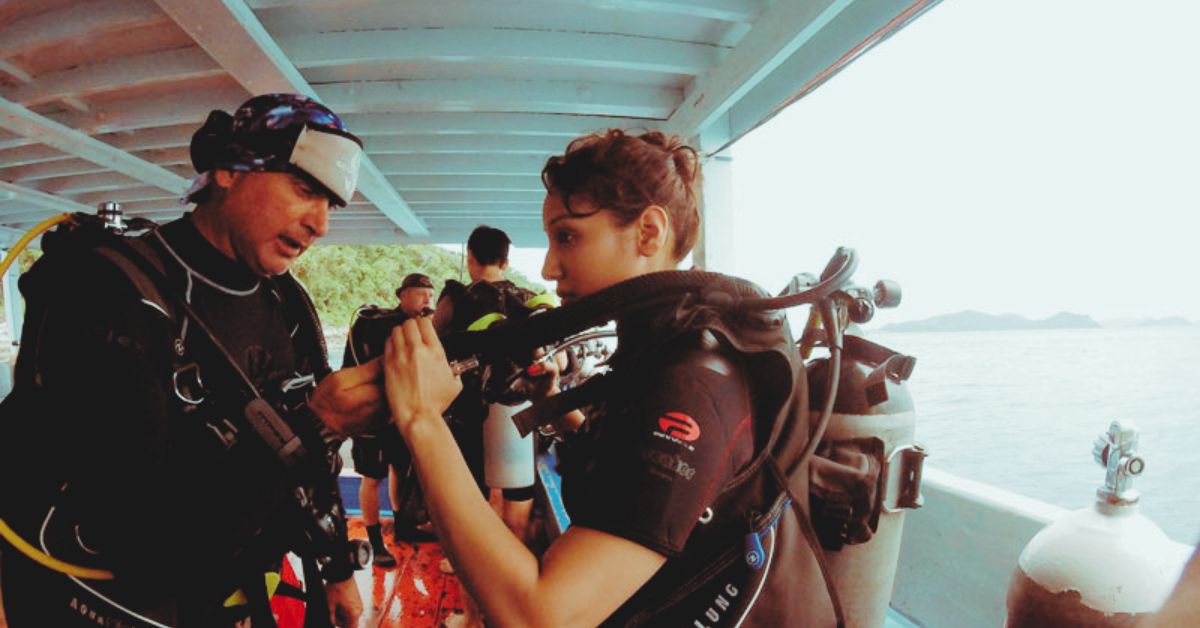Top 10 Mistakes New Divers Make—And How to Avoid Them
Scuba diving is one of the most exhilarating and rewarding adventures you can undertake, but starting your underwater journey isn’t without its challenges. Many new divers unknowingly make mistakes that can hinder their progress, safety, and enjoyment. By understanding the top 10 mistakes new divers make—and how to avoid them, you can ensure your dive experiences are both safe and unforgettable. Let’s dive into these common errors and explore practical solutions to help you grow into a confident and skilled diver.
Mistake #1: Choosing the Wrong Dive Center or Instructors
Choosing the right dive center is crucial to avoid one of the Top 10 Mistakes New Divers Make—starting your scuba journey with poor training. Opt for a PADI 5-Star Dive Center, as it ensures top-quality instruction, certified instructors, and adherence to strict safety standards. These centers help you build confidence, which is essential to prevent other common diving errors. Well-maintained equipment and structured courses are vital for a smooth start. Additionally, checking reviews can help you avoid another of the Top 10 Mistakes New Divers Make—trusting a dive center without knowing their reputation. Positive feedback from previous divers often highlights excellent safety practices, skilled instructors, and high-quality customer service.
Why This Mistake Happens
- Lack of Research: Many beginners don’t know how to evaluate a dive center’s quality.
- Prioritizing Cost Over Quality: Some choose the cheapest option, ignoring factors like certification standards or instructor experience.
- Overlooking Reviews and Recommendations: Failing to consider feedback from other divers can lead to poor decisions.
How to Avoid It
- Look for Certification: Choose a PADI 5-Star Dive Center with certified and experienced instructors.
- Read Reviews: Check online reviews and speak with previous students to ensure the center has a solid reputation.
- Ask About Class Sizes: Smaller groups mean more personalized attention, helping you learn and build confidence faster.
Mistake #2: Skipping Routine Pre-Dive Safety Checks
Ignoring or rushing through pre-dive safety checks is one of the most avoidable mistakes new divers make. Proper safety checks are crucial for ensuring your gear is functioning correctly and for avoiding unnecessary risks underwater.
Why This Mistake Happens
- Overconfidence: New divers may assume the gear is fine without checking it thoroughly.
- Eagerness to Dive: Excitement can lead to skipping important pre-dive routines.
- Lack of Knowledge: Some beginners don’t fully understand how to inspect their gear.
How to Avoid It
- Follow BWRAF: Use the acronym (BCD, Weights, Releases, Air, Final Check) to methodically check all gear.
- Practice Makes Perfect: Learn how to perform a thorough gear check with an instructor before attempting it independently.
- Communicate with Your Buddy: Always double-check your buddy’s gear and have them inspect yours in return.
Mistake #3: Rushing Through the Dive
In scuba diving, patience is not just a virtue—it’s a necessity. Many new divers make the mistake of rushing, whether it’s during training, gear setup, or the dive itself, which can lead to safety issues and missed learning opportunities.
Why This Mistake Happens
- Anxiety or Excitement: Beginners may feel nervous or overly eager to get underwater.
- Group Pressure: Trying to keep up with more experienced divers can lead to hurried decisions.
- Overlooking the Importance of Pacing: Rushing through tasks like equalizing can have serious consequences.
How to Avoid It
- Practice Patience: Slow down and enjoy the process—diving isn’t a race.
- Focus on Equalizing: Descend slowly and equalize early and often to avoid ear discomfort or injury.
- Stay Mindful: Pay attention to your breathing and surroundings, and don’t be afraid to ask for more time if needed.
Mistake #4: Being Afraid to Ask Questions
Many new divers hesitate to ask questions, fearing they’ll appear inexperienced. This is one of the most preventable mistakes, as asking questions is essential for building skills and confidence.
Why This Mistake Happens
- Fear of Judgment: Worrying about looking “clueless” in front of others.
- Assumptions: Believing some questions, like “How do I clear my mask?” are too basic to ask.
- Lack of Confidence: Feeling unsure about when or how to approach instructors with questions.
How to Avoid It
- Ask Anything: There’s no such thing as a silly question when it comes to safety and skill-building.
- Use Dive Briefings: Take full advantage of pre-dive briefings to clarify any uncertainties.
- Remember the Experts Were Beginners Too: Instructors and experienced divers are there to help—they started just like you.
Mistake #5: Buying Cheap or Unknown Equipment
Cutting corners on scuba gear can lead to discomfort, malfunctions, or even safety risks underwater. Investing in quality equipment is crucial for any diver, especially beginners.
Why This Mistake Happens
- Budget Constraints: Beginners often prioritize saving money over gear quality.
- Lack of Knowledge: New divers may not know which brands or features to look for.
- Impulse Purchases: Buying online without trying the gear can result in poor fit or performance.
How to Avoid It
- Rent Before You Buy: Use rental gear to determine what works best for you before committing to a purchase.
- Stick to Reputable Brands: Invest in trusted brands known for quality and safety.
- Seek Advice: Consult instructors or dive shop staff when choosing equipment.
Mistake #6: Improper Buoyancy Control
Mastering buoyancy is one of the most critical skills in scuba diving, yet it’s a common struggle for new divers. Poor buoyancy control can result in excessive air consumption, damage to marine life, or even dangerous ascents.
Why This Mistake Happens
- Incorrect Weighting: Beginners often use too much or too little weight.
- Overusing the BCD: Relying on equipment rather than breathing control to manage buoyancy.
- Lack of Experience: Learning buoyancy takes time and practice.
How to Avoid It
- Practice in a Pool: Experiment with buoyancy control in a controlled environment.
- Adjust Your Weight: Conduct weight checks to find the perfect balance.
- Use Breathing Techniques: Control your buoyancy naturally by adjusting the depth and rhythm of your breathing.
Mistake #7: Poor Air Management
Running out of air too quickly is a common issue for beginners, often caused by nervousness or inefficient movements.
Why This Mistake Happens
- Overexertion: Heavy breathing from anxiety or excitement wastes air.
- Inefficient Swimming: Thrashing movements increase air consumption.
- Forgetting to Monitor Air Supply: Beginners may lose track of their SPG readings.
How to Avoid It
- Stay Calm: Relax and focus on slow, steady breathing.
- Swim Efficiently: Streamline your body and use slow, deliberate movements.
- Check Your Air Frequently: Regularly monitor your SPG to stay aware of your air supply.
Mistake #8: Not Equalizing Properly
Improper equalization is one of the most uncomfortable mistakes new divers make. It can lead to ear pain, barotrauma, or even a canceled dive.
Why This Mistake Happens
- Rushing the Descent: Beginners may descend too quickly without equalizing.
- Improper Technique: Using the wrong method or waiting too long to equalize.
- Ignoring Pain: Some divers push through ear discomfort, leading to injury.
How to Avoid It
- Start Early: Begin equalizing on the surface and continue frequently during descent.
- Learn Multiple Techniques: Try swallowing, moving your jaw, or pinching your nose to find what works for you.
- Ascend If Needed: If you experience pain, ascend slightly and try equalizing again.
Mistake #9: Underestimating the Importance of Dive Planning
Neglecting to plan your dive properly can result in unnecessary risks or an unfulfilling experience.
Why This Mistake Happens
- Overconfidence: Relying too much on the dive guide or buddy.
- Lack of Knowledge: New divers may not understand the importance of dive planning.
- Skipping Research: Ignoring local dive site conditions like currents or visibility.
How to Avoid It
- Collaborate with Your Buddy: Discuss the dive plan, including depth limits and emergency protocols.
- Research Dive Sites: Understand site conditions, currents, and marine life.
- Stick to the Rule of Thirds: Allocate one-third of your air for descent, one-third for the dive, and one-third for ascent.
Mistake #10: Inefficient Movements and Poor Streamlining
Thrashing movements not only waste energy but also disrupt marine life and increase air consumption.
Why This Mistake Happens
- Lack of Awareness: Beginners may not realize the impact of their movements.
- Poor Technique: Incorrect finning or swimming posture creates unnecessary drag.
- Overloaded Gear: Bulky or poorly arranged equipment adds to the problem.
How to Avoid It
- Streamline Your Gear: Minimize drag by securing hoses and accessories.
- Practice Finning Techniques: Focus on efficient kicks like the flutter or frog kick.
- Relax: Move slowly and deliberately to conserve energy and air.
FAQs About New Diver Mistakes
1. How do I choose the right dive center?
Choosing the right dive center is crucial for a safe and enjoyable diving experience. Opt for a PADI 5-Star Dive Center, which guarantees top-quality training, certified instructors, rigorous safety standards, and well-maintained equipment. These centers offer structured courses for all levels, ensuring you progress confidently. Additionally, check reviews from past customers to gauge the quality of instruction and service. Positive testimonials about safety, instructors, and overall experience can give you the assurance you’re making the best choice for your diving journey.
2. Why are pre-dive safety checks important?
They ensure your equipment is functioning properly and reduce risks during your dive.
3. How can I improve my buoyancy?
Practice regularly, perform weight checks, and focus on using your breathing to control buoyancy naturally.
4. What should I do if I can’t equalize?
Ascend slightly, try a different technique, and never force equalization. Safety comes first.
5. How can I conserve air underwater?
Stay calm, move efficiently, and monitor your SPG regularly. Avoid unnecessary exertion.
6. Is it okay to rent scuba gear?
Yes, but always inspect rental gear and ensure it fits properly before use.
7. How do I overcome nervousness about asking questions?
Remember that instructors are there to help, and asking questions ensures your safety and learning.
8. What’s the best way to plan a dive?
Collaborate with your buddy, research the site, and follow the Rule of Thirds for air management.
Common Myths About Diving Mistakes
When starting out as a diver, it’s easy to get caught up in misconceptions that can lead to unnecessary stress or bad habits. Let’s tackle a few common myths about diving mistakes that might hold you back—and set the record straight so you can dive with confidence.
Myth 1: “If I don’t have perfect buoyancy right away, I’ll never be a good diver.”
The Reality:
Buoyancy control is a skill that takes time, practice, and patience to master. Even experienced divers occasionally adjust their weighting or refine their techniques based on new environments or gear. As a beginner, it’s normal to struggle a bit with neutral buoyancy, but this doesn’t mean you won’t become a skilled diver.
Why It’s Wrong:
- Learning Curve: Neutral buoyancy is an advanced skill for beginners, and no one gets it perfectly on their first dive.
- Environment Variability: Different dive conditions (e.g., saltwater vs. freshwater, drysuits, or varying currents) require adjustments—even for pros.
What to Do Instead:
- Keep practicing in shallow water or pools.
- Ask your instructor for real-time feedback during your dives.
- Focus on breathing techniques—slow, controlled breathing is the key to buoyancy.
Remember, every dive is an opportunity to improve!
Myth 2: “I shouldn’t ask my instructor too many questions—I might annoy them.”
The Reality:
There’s no such thing as “too many questions” when it comes to diving safety and learning. Instructors are there to guide you and ensure you’re confident in the water. They’ve likely heard every question before and will appreciate your curiosity because it shows you’re taking your training seriously.
Why It’s Wrong:
- Safety First: Asking questions ensures you understand crucial concepts and procedures.
- Building Confidence: Clarifying doubts makes you more comfortable and less prone to mistakes underwater.
What to Do Instead:
- Don’t hesitate to ask anything, no matter how simple it seems, whether it’s about clearing your mask or dive site conditions.
- Use the dive briefing as a perfect opportunity to voice concerns or clarify techniques.
- Remind yourself that even your instructor was a beginner once—they understand your position.
Myth 3: “Expensive dive gear is just for pros; cheap gear is fine for beginners.”
The Reality:
Your scuba gear is your lifeline underwater, and investing in quality equipment is essential—whether you’re a beginner or an experienced diver. Cheap, untested, or unknown-brand equipment can fail when you need it most, leading to discomfort or even dangerous situations.
Why It’s Wrong:
- Safety Concerns: Poorly made gear may not meet industry standards, increasing the risk of malfunctions.
- Comfort Matters: Ill-fitting or low-quality gear can distract you during a dive, taking away from the experience.
- Longevity: High-quality gear lasts longer, making it a better investment over time.
What to Do Instead:
- If you’re on a budget, start with small but essential purchases like a mask and snorkel—then rent other gear until you’re ready to invest.
- Stick to reputable dive brands that are well-known in the industry.
- Consult instructors or dive shop professionals for recommendations tailored to your needs.
Investing in reliable gear means you’re investing in your safety, comfort, and long-term enjoyment of diving.
Breaking the Myths, Building Confidence
By letting go of these common myths, you can approach diving with a clearer mindset and focus on learning at your own pace. Scuba diving is a journey, not a race, and mistakes are part of the process. Embrace them, ask questions, invest in yourself, and enjoy every moment underwater!
Build Confidence with PADI Courses
Confidence underwater comes with the right training and experience, and PADI courses are designed to help you develop both. Whether you’re a first-timer or looking to advance your skills, PADI offers a range of courses that focus on building your confidence step by step.
- PADI Open Water Diver Course: Perfect for beginners, this course provides the foundational skills and knowledge you need to feel comfortable underwater. Through hands-on practice and expert guidance, you’ll gain the confidence to tackle your first open water dives.
- PADI Advanced Open Water Diver Course: For those looking to expand their skills, this course introduces you to new dive environments and activities, such as deep diving and navigation. The variety of experiences helps you grow more confident in diverse underwater conditions.
- PADI Peak Performance Buoyancy Specialty: If buoyancy control feels intimidating, this specialty course focuses specifically on helping you master it. You’ll learn techniques to stay neutrally buoyant and conserve energy, which builds confidence and improves your overall dive experience.
- PADI Rescue Diver Course: This course teaches you how to prevent and handle emergencies, giving you the skills to stay calm and confident in challenging situations. Knowing how to help yourself and others boosts your assurance on every dive.
Training with certified PADI professionals ensures you learn at your own pace in a safe, supportive environment. With each course you complete, you’ll not only enhance your skills but also gain the confidence to take on new underwater adventures!
Conclusion: Dive Smarter, Dive Safer
Avoiding the top 10 mistakes new divers make is an essential step to becoming a confident and skilled scuba diver. By choosing the right dive center, asking questions, taking your time, and investing in the right equipment, you’ll set yourself up for a safe, enjoyable, and rewarding journey into the underwater world.
Remember, scuba diving isn’t about perfection—it’s about progress. Each dive is a chance to improve, explore, and connect with the incredible beauty beneath the surface.
Welcome to the diving community! Whether you’re preparing for your first dive or working to refine your skills, know that you’re joining a passionate group of adventurers who were all beginners once, just like you. Take a deep breath (literally!), stay curious, and get ready to experience the unforgettable wonders of the ocean.
If you’re ready to take the plunge or have any questions, we’re here to help! Contact us to learn more about our courses, dive trips, or advice on how to make the most of your underwater journey.


